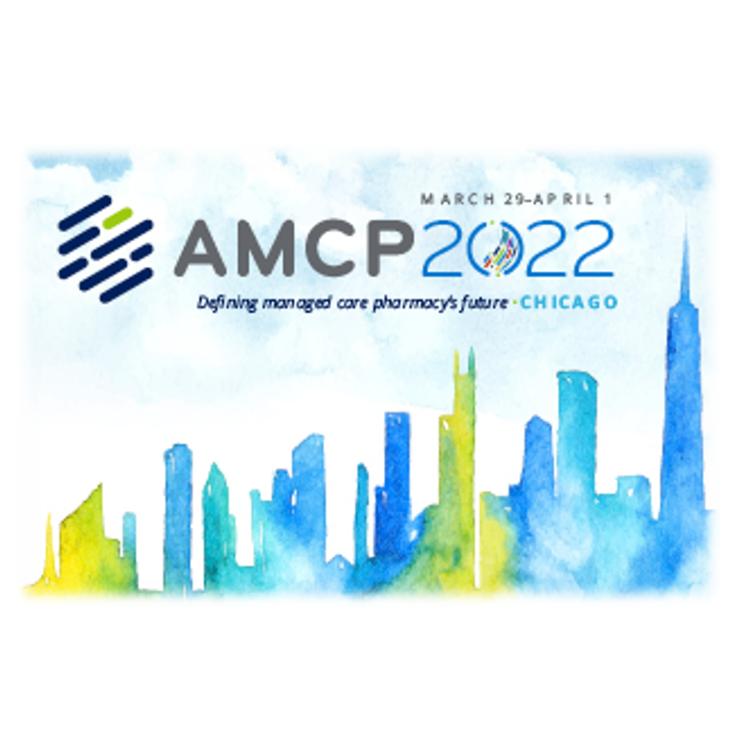During the Academy of Managed Care Pharmacy 2022 Annual Meeting from March 29 – April 1 in Chicago, NPC Vice President of Research Michael Ciarametaro, MBA, and former NPC Research Manager Brian Sils, MPP, shared their research at a panel and poster session during the event. NPC also hosted the Student and New Practitioner Reception on Wednesday, March 30th! Check out the highlights below!

AMCP 2022 Student & New Practitioner Reception
AMCP's CEO Susan Cantrell and NPC's President & CEO John O'Brien share welcoming remarks.
Students and new practitioners enjoy networking and mingling with NPC Staff.
Gene Therapy Value-Based Purchasing and the Impact of Medicaid Best Price Changes
Educational Session | Wednesday, March 30 | 2:45 PM – 4:00 PM CT

Session Description
As innovation and research continue, curative cell and gene therapies hold the promise to transform the treatment and care for specific conditions. It is understood that these promising treatments may also create some upfront financial risk due to their cost and uncertain long-term sustained efficacy. There are many alternative payment models that have been proposed to assist in financing these therapies while mitigating some of the risk including milestone contracts, warranties, and annuities.
One hurdle to the adoption of these alternative payment models to support patient access and payer sustainability is the 1990 Medicaid Best Price rules. The Centers for Medicare and Medicaid Services (CMS) is implementing a new rule in July of 2022. What changes will this rule bring that may assist payers in implementing alternative payment models? How will value-based or performance-based payment programs work?
This session explored the use of alternative payment approaches that are used to manage the financial risk associated with curative treatments, the possible adoption of value-based performance arrangements, and legislative enhancements to the Medicaid Drug Rebate Program.
Faculty:
- Kim A. Caldwell, RPh, Principle, Texas Star Healthcare Consulting, LLC
- Michael Ciarametaro, MBA, Vice President of Research, National Pharmaceutical Council
- Mark Trusheim, MS, Strategic Director, NEWDIGS, Visiting Scientist, Sloan School of Management, Massachusetts Institute of Technology
Out-of-Pocket Costs for Oral Anticancer Medications and Adherence Among Patients with Cancer: A 2010-2018 Nationwide Claims Analysis
Poster Presentation #C13 | Thursday, March 31 | 12:00 PM – 1:15 PM CT
Background: During the past decade, there has been a substantial increase in the approval and use of oral anticancer medications (OAM). Patient adherence to OAM may be influenced by many factors, including patient demographic and socioeconomic characteristics, patient out-of-pocket (OOP) costs, disease- and therapy-related factors, and health system factors.
Objectives: To determine proportion of patients adherent to OAM among those newly initiating therapy and to identify predictors of patient adherence with OAM including patient OOP costs.
Co-Authors:
- (Presenter) Ami Vyas, PhD, MS, MBA, Assistant Professor, HEOR, College of Pharmacy, University of Rhode Island
- Andrew Descoteaux, MS, Graduate Teaching Assistant, University of Rhode Island
- Stephen Kogut, PhD, MBA, Professor, College of Pharmacy, University of Rhode Island
- Patrick Campbell, PharmD, PhD, Senior Director of Research, Pharmacy Quality Alliance
- Megha Parikh, PhD, MS, Senior Research Scientist
- Amanda Green, MPH, Research Associate, National Pharmaceutical Council
- Kimberly Westrich, MA, Vice President of Health Services Research, National Pharmaceutical Council
Specialty Drug Use and Healthcare Utilization Vary by Wage Level in Employer-Sponsored Health Plans
Poster Presentation #Z12 | Thursday, March 31 | 1:15 PM – 2:30 PM CT
Background:
Spending on specialty medications for autoimmune conditions (SpRx-AIC) has increased in recent years, raising affordability concerns for employers. This has led to greater patient cost-sharing through plan benefit design, the use of consumer-directed health plans, higher deductible thresholds, and copay accumulator adjustment programs. Prior studies have shown differential patterns of health care utilization in association with wage, driven in part by affordability issues. Out-of-pocket costs associated with SpRx-AIC have been shown to impact medication adherence, particularly for those with low incomes.
Objective:
To assess the association of wage status on SpRx-AIC use and cost patterns among employees with employer-sponsored health insurance.
Co-Authors:
- (Presenter) Brian Sils, MPP, formerly Research Manager, National Pharmaceutical Council
- Bruce Sherman, MD, Assistant Clinical Professor, Case Western Reserve University
- Leah Kamin, MPH, Anaylitic Advisor, IBM Watson Health
- Kimberly Westrich, MA, formerly Vice President of Health Services Research, National Pharmaceutical Council
